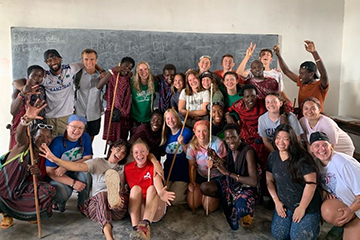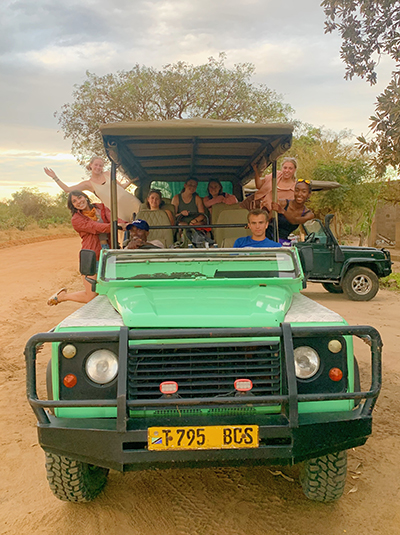
02/19/2024
SUNY Cortland’s newest academic major in tourism and recreation will introduce students to life-changing experiences across the world and prepare them for a booming global industry.
The new program also is unique within the State University of New York system.
“There’s nothing quite like our focus on sustainable tourism,” said Kenneth Cohen, associate professor in the university’s Recreation, Parks and Leisure Studies Department and the faculty member who is leading the major. “When we talk about sustainability, we’re looking at the cultural, economic and environmental dimensions of tourism and balancing them together, so that (tourism) not only helps the economy but it improves the communities where it takes place.”
In other words, SUNY Cortland’s take on tourism digs deeper than planning a vacation to Disney or snapping jaw-dropping sunset photos for Instagram. Over the past several years, Cohen has guided service-oriented trips to places like Hawaii and Tanzania in an effort to provide authentic insight into different cultures. The goal is to show students that effective tourism often involves an immersive learning experience, not merely postcard views.
“Our students want to do some good in the world and they want to be job-ready,” Cohen said. “They want something that’s dynamic. They want to be outside, doing different things, working with different populations. They want variety.
“They see the opportunities we offer and the things that we do, and suddenly it becomes clear that they can make a living in tourism – and a good one at that.”
According to a 2023 economic impact report from the World Travel and Tourism Council, the U.S. travel and tourism sector grew by 16.9% in 2022, reaching $2 trillion in gross domestic product contributions. The travel and tourism sector also created 2.7 million more jobs that same year, compared to 2021.
Cohen offered several examples of early career possibilities: working for a convention bureau or a local chamber of commerce; traveling the world with an international tour operation; or planning events that span everything from music festivals to weddings. The major’s coursework is designed to provide a set of foundational, transferrable skills in areas such as marketing, budgeting and risk management.
“We want students to really reflect their interests,” Cohen said. “And through this major, they can turn those interests into an occupation.”
He credited SUNY Cortland’s central location in New York state and its proximity to community-based operations that nurture sustainable tourism. Potential nearby locations for internships and service could include New York State Parks, Homer Center for the Arts, Lime Hollow Nature Center, Greek Peak Mountain Resort and many other travel destinations throughout the Finger Lakes region.
But perhaps the program’s most distinctive aspect is an eye-opening travel opportunity that allows students to work with non-profit organizations as part of an immersive ecotourism course. Working with Growth International Volunteer Excursions (GIVE), a non-profit tour operator, Cohen has led several 10-day excursions in Hawaii and Tanzania during spring breaks and the university’s winter and summer sessions.
Approximately 45 students have joined the trips so far. Their personal journal excerpts point to the type of transformational experience that come with effective tourism, with many students referring to it as the trip of a lifetime.
Cortland groups have traveled to Hawaii to help restore fish ponds, a practice that allows natives to preserve their fish stocks across generations. In Zanzibar, Tanzania, students have worked with local schools to assist with an adult English language course. That training empowers parents in Tanzania to help their school-age children with English coursework and exams, which in turn helps both groups gain skills that can pay off for a lifetime.
Cohen noted that students do not simply “parachute in” for a vacation; hybrid coursework prior to their travels introduces them to unique cultural aspects of the destinations they visit.
“When we go into these communities, we travel responsibly,” said Cohen, who explored the Mediterranean region during his own studies. “A big part of that is understanding the customs and traditions. Through that, we’re able to go to places that other people don’t go. We’re invited on to sacred land. We’re invited to ceremonies. And we seldom see other tourists.

“That’s a foundational piece of all of our tourism initiatives — this cultural authenticity that is difficult to achieve. So, we’re very respectful and, in turn, we’re received with a great deal of hospitality.”
He tells students enrolled in the course that their trip actually begins when they arrive home, in the ways that they are able to impart the lessons learned overseas and utilize them in local opportunities.
SUNY Cortland students recently created a GIVE Club focused on service projects and sustainability. Members are not required to have taken the course and they do not need to be enrolled in the major. The club seeks to provide community for students looking to make local contributions in ways similar to the ecotourism course.
“When we travel, we see the rich culture, the connection to land, that sense of place,” Cohen said. “And students rediscover that in their own communities.
“When you have that perspective, you really move beyond service-level hospitality employment and you start moving into destination management, tour operations, just a whole variety of more community-based opportunities where we’re so rich in this region.”
The university’s Recreation, Parks and Leisure Studies Department hopes to eventually add a minor in tourism and recreation for students from other academic majors. Future students do not need to be seasoned travelers or experts in the outdoors, according to Cohen. They simply need to be interested in meaningful work that introduces others to rich and authentic cultural experiences.
“One thing that I like to say about our program is that it’s not just about what you do, but who you are,” Cohen said. “We’re seeking to attract bright, caring people who want to make a positive impact through the work that they do. In my mind, there’s no better place for that than SUNY Cortland, and this program is an important part of the overall mission to achieve that goal.”
Photo identification: Students enrolled in an ecotourism course at SUNY Cortland traveled to Zanzibar, Tanzania in Summer 2023. The course helped inspire the university’s newest major in tourism and recreation.